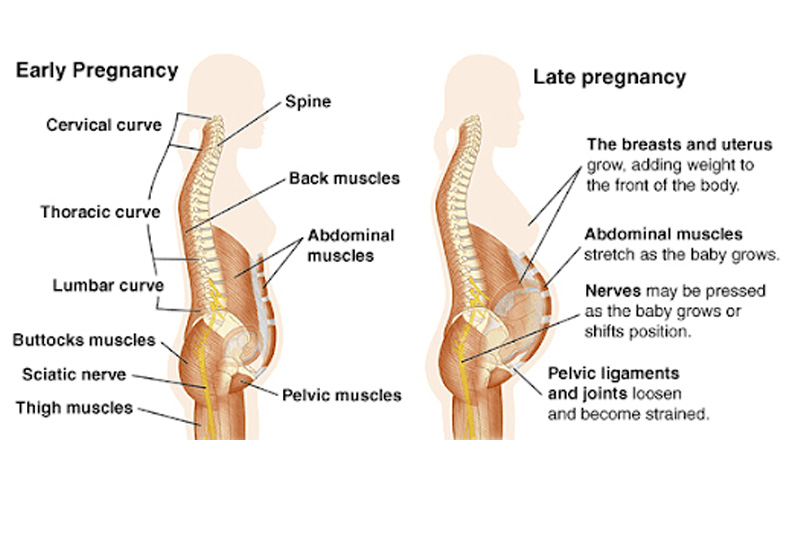CONDITIONS
Pregnancy Care
Overview
For many pregnant women, aches and pains in the lower back and hips are part of the experience. In fact, approximately 50 percent of pregnant women will experience back pain at some point before they deliver. During pregnancy, there are many changes that occur in the body to accommodate the growth of the baby. These changes often lead to common aches and discomfort pregnant mothers experience, such as low back pain. Regular visits to a chiropractor during pregnancy can address these issues.
Is Chiropractic Care Safe During Pregnancy?
Yes, absolutely. Over at Peak Health Chiropractic, we perform specific chiropractic sacral and pelvic analysis and adjustments specifically for pregnant moms. Using a pregnancy pillow at different stages of your pregnancy is comfortable and the adjustments are helpful in improving the nervous system function, providing a more balanced pelvic bone, muscles and ligaments. Benefits of chiropractic care during pregnancy includes lesser lower back pain, more comfort and movement, better sleep, and posture, it also optimizes the baby’s ability to get into the best possible position for birth.

Causes of pregnancy discomfort
Muscle or ligament strains from sudden twisting movements, placing heavy objects on neck region or from the nature of your job of prolonged desk-bound position/heavy & unnatural carrying of heavy things/children causing symptoms such as pain, stiffness, joint swelling and jamming of neck.
Hormonal Changes:
- Morning Sickness: Elevated levels of the hormone hCG (human chorionic gonadotropin) in early pregnancy are thought to be a significant contributor to nausea and vomiting.
- Breast Tenderness: Increased levels of estrogen and progesterone cause the breasts to prepare for lactation, leading to sensitivity and tenderness.
- Mood Swings: Due to Fluctuations in hormones like estrogen and progesterone.
Increased Blood Volume and Circulation:
- Varicose Veins and Hemorrhoids: Increased blood volume and the weight of the growing uterus can strain veins, particularly in the legs and rectal area.
- Shortness of Breath: Increased blood volume requires the heart to work harder, potentially leading to breathlessness.
- Swelling (Edema): Retention of more fluids and altered blood circulation can lead to swelling in the ankles, feet, and hands.
Physical Growth of the Fetus and Uterus:
- Back Pain: The growing uterus and fetus shift the woman’s center of gravity, putting strain on the back.
- Heartburn and Indigestion: The enlarging uterus pushes the stomach and other organs upwards, potentially leading to acid reflux.
- Frequent Urination: As the fetus grows, the uterus exerts more pressure on the bladder.
- Round Ligament Pain: The growing uterus stretches supporting ligaments, causing discomfort.
Changes in Muscle and Bone Structure:
- Pelvic Pain: Relaxation and stretching of pelvic bones and the symphysis pubis joint, due to the hormone relaxin, can cause discomfort.
Leg Cramps: Changes in calcium and magnesium metabolism, or pressure from the growing uterus on nerves, might contribute to leg cramps.
Other causes:
Changes in Digestive System:
- Constipation: Elevated progesterone levels can slow down the movement of the intestines.
- Haemorrhoids: Constipation and increased pressure on the veins in the pelvis can contribute to haemorrhoids.

Symptoms of Pregnancy discomfort
- Back Pain: The extra weight and changes in the center of gravity can strain the back. Additionally, hormonal changes can loosen the joints and ligaments, adding to the discomfort.
- Breast Tenderness: Hormonal changes can make breasts tender, sore, or swollen early in pregnancy.
- Fatigue: Many women feel particularly tired in the first and third trimesters.
- Frequent Urination: The growing uterus can put pressure on the bladder, causing a need to urinate more often.
- Constipation: Increased levels of the hormone progesterone can slow down the digestive system.
- Hemorrhoids: Increased blood circulation and pressure from the growing uterus can cause swollen veins in the rectal area.
- Shortness of Breath: As the uterus expands, it can press against the diaphragm, making it harder to breathe deeply.
- Swollen Feet and Ankles: The body retains more fluid during pregnancy, leading to swelling, particularly in the feet and ankles.
- Round Ligament Pain: Stretching of the ligaments that support the uterus can cause sharp, stabbing, or dull pains in the lower abdomen or groin area.
- Leg Cramps: These are common in the second and third trimesters and are often experienced at night.
- Insomnia: Due to discomfort, anxiety, or frequent need to urinate, many women have trouble sleeping.
Mood Swings: Hormonal changes, fatigue, and physical discomforts can affect mood

How can Chiropractic care help with pregnancy spine related issues?
Your chiropractor will:
- Thoroughly review your health history.
- Conduct a series of tests and examinations which includes – orthopaedic examination, neurological examination, posture and gait examination, range of motion test and weight distribution test.
- Recommend other examinations or tests.
- Analyse the test results and present to you a report of finding, together a care plan will be recommended to suit your needs and goals.
Labor and Birth
With a well-functioning nervous system, pregnant mothers will have shorter labor time and a more optimal position in the hips and pelvis for delivery, causing less trauma for mother and child.
Birth trauma may occur even with the most gentle and non-invasive birth process. More invasive birthing interventions such as the use of forceps, a vacuum extraction. Mothers who go through long labor hours may experience disc pathology which show up as sciatica type symptoms or cervical disc pathology.
Benefits of Chiropractic for pregnancy care
- Maintaining a healthier pregnancy
- Controlling symptoms of nausea
- Reducing the time of labour and delivery
- Relieving back, neck or joint pain
- Preventing a potential sciatica symptoms
Post delivery care
Spinal trauma for mother and child can occur during the birth process. This results in irritation to the nervous system which can be the cause of many problems for a newborn. Poor appetite, breathing difficulty, colic, difficult nursing or showing preference for one side form restricted movement of the head can often be traced to nervous system dysfunction caused by a malfunctioning spine. A lot of negative effects from the hormonal changes would add to the injury. Hormone relaxin in particular would cause weakening of your joints and uncorrected spinal subluxations would tend add insult to injury where mothers experiences more aches and pain in their spine.
Chiropractic care focuses on the post delivery care for mothers to regain back their health and help combat the stresses of raising up children’s not to mention the poor quality sleep during the first few months

